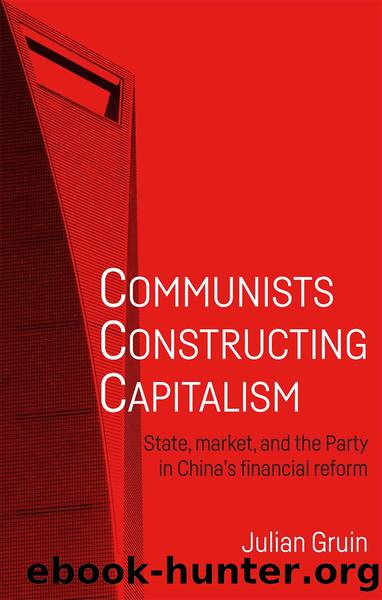Communists Constructing Capitalism by Julian Gruin

Author:Julian Gruin [Gruin, Julian]
Language: eng
Format: epub
ISBN: 9781526135322
Google: TwhKwAEACAAJ
Publisher: ManchesterUP
Published: 2019-09-15T20:55:55+00:00
Source: Interview, 5 June 2012, Beijing â Chinese Academy of Social Sciences.
This first round of recapitalization and NPL disposal left the SOCBs with a remaining RMB 2.2 trillion of NPLs still on their books. The terms of Chinaâs WTO accession in 2001 included a five-year window until 2006 for the granting of full access to Chinaâs financial sector to foreign financial institutions. The PBOC was seen as the clear candidate to assume primary responsibility for further reform of the SOCBs, given the technocratic expertise at its disposal and the rising status of its newly appointed governor Zhou Xiaochuan. The MOF-led recapitalization and NPL disposal of 1998â99 had been achieved by drawing upon fiscal resources; these were now overstretched, and it was therefore seen as necessary to either draw upon domestic or foreign private capital. Either option involved change in the ownership structure of the banks, and the PBOC was caught between the expectations of an evolving market environment and an imperative that notwithstanding the status of either foreign or domestic private actors in the process of shareholding reform, the banking system would remain subject to ultimate authority vested in the CCP. In this respect, despite greater receptiveness to the utility of markets in the financial sector on the part of the PBOC (Bell and Feng 2013), the perceptions of MOF and PBOC officials towards the rationale for banking reform were both rooted in Zhu Rongjiâs plans for rationalization and streamlining of the state, and thus evinced a continuity from the late 1990s to the 2000s following Zhuâs retirement. Some sense of this can be seen how, in response to a question about Chinaâs âprivatizationâ process, a âtaken abackâ Zhu Rongji remarked to former US President George H. W. Bush in 1998 that,
Mr Bush, China isnât privatizing. Weâre creating a shareholding system, and a shareholding system is only one of many forms of public ownership. (Zhu 2011, 248)
As Schell and Delury (2013, 342) have argued, âZhu was categorical on this point⦠. The ultimate goal of these reforms ⦠was not to dismantle the state sector, but to streamline it and thereby make it a stronger element of Dengâs new form of marketized socialism.â
The goal of transforming the banking system from a scattered assortment of liabilities into a source of national economic strength was thus closely bound up with the âpublicâ listing of the SOCBs. Liu Mingkang (2004), chairman of the newly established CBRC, argued in 2004 that the government actions in 1998â99 had been focused on reducing the financial difficulties of banks rather than on overhauling inherent structural problems, and it had become clear that the banks should do more to streamline and rationalize their organizational structures. The policymaking process was underpinned within the Party through the Central Leading Group on Shareholding Reform of the State Banks [ä¸å¤®å½æåä¸é¶è¡ è¡ä»½å¶æ¹é©é¢å¯¼å°ç»], which was established by Wen Jiabao in January 2003. This brought together all of the senior financial figures under CCP authority and was chaired by Vice-Premier and PSC member Huang Ju.
Download
This site does not store any files on its server. We only index and link to content provided by other sites. Please contact the content providers to delete copyright contents if any and email us, we'll remove relevant links or contents immediately.
| Anarchism | Communism & Socialism |
| Conservatism & Liberalism | Democracy |
| Fascism | Libertarianism |
| Nationalism | Radicalism |
| Utopian |
The Secret History by Donna Tartt(19086)
The Social Justice Warrior Handbook by Lisa De Pasquale(12190)
Thirteen Reasons Why by Jay Asher(8909)
This Is How You Lose Her by Junot Diaz(6886)
Weapons of Math Destruction by Cathy O'Neil(6279)
Zero to One by Peter Thiel(5801)
Beartown by Fredrik Backman(5754)
The Myth of the Strong Leader by Archie Brown(5507)
The Fire Next Time by James Baldwin(5442)
How Democracies Die by Steven Levitsky & Daniel Ziblatt(5218)
Promise Me, Dad by Joe Biden(5153)
Stone's Rules by Roger Stone(5087)
A Higher Loyalty: Truth, Lies, and Leadership by James Comey(4962)
100 Deadly Skills by Clint Emerson(4925)
Rise and Kill First by Ronen Bergman(4788)
Secrecy World by Jake Bernstein(4753)
The David Icke Guide to the Global Conspiracy (and how to end it) by David Icke(4717)
The Farm by Tom Rob Smith(4507)
The Doomsday Machine by Daniel Ellsberg(4490)
